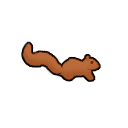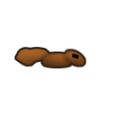Difference between revisions of "Squirrel"
m (→Analysis) |
m (→Analysis) |
||
| Line 57: | Line 57: | ||
With very low health and a low melee damage, one might think this critter to be harmless. But due to its fast speed and very fast attack rate, your colonists may suffer many bleeding wounds very quickly, adding up to a potentially lethal threat. Their small size makes them hard to shoot, and a large group of squirrels turned [[Mental break#Manhunter|manhunter]] can be especially dangerous. | With very low health and a low melee damage, one might think this critter to be harmless. But due to its fast speed and very fast attack rate, your colonists may suffer many bleeding wounds very quickly, adding up to a potentially lethal threat. Their small size makes them hard to shoot, and a large group of squirrels turned [[Mental break#Manhunter|manhunter]] can be especially dangerous. | ||
| − | Otherwise, squirrels offer a tiny amount of food when hunted, equal to that of the [[rat]]. They have no particular use as tamed animals, not valuable in meat or food. Even as "bait" animals, rats and [[hare]]s are better at the task. Hares are faster | + | Otherwise, squirrels offer a tiny amount of food when hunted, equal to that of the [[rat]]. They have no particular use as tamed animals, not valuable in meat or food. Even as "bait" animals, rats and [[hare]]s are better at the task. Hares are faster and just as difficult to tame, while rats are omnivores and easier to tame. Both can be found in all biomes that squirrels reside in. |
==Training== | ==Training== | ||
Revision as of 05:53, 16 March 2023
Squirrel
One of the many hardy rodent species that follows humankind everywhere it spreads. Squirrels are distinguished by their bushy tails, which they use as umbrellas in bad weather.
Base Stats
- Type
- Animal
- Flammability
- 70%
Pawn Stats
- Move Speed
- 5.1 c/s
- Health Scale
- 25% HP
- Body Size
- 0.2
- Mass - Baby
- 2.4 kg
- Mass - Juvenile
- 6 kg
- Mass - Adult
- 12 kg
- Carrying Capacity
- 15 kg
- Filth Rate
- 1
- Hunger Rate
- 0.16 Nutrition/Day
- Diet
- herbivorous
- Life Expectancy
- 8 years
- Manhunter Chance
- 0%
- Manhunter Chance (Taming)
- 0%
- Trainable Intelligence
- None
- Wildness
- 75%
- Minimum Handling Skill
- 7
- Mate Interval
- 12 hours
- Maturity Age
- 0.222 years (13.3 days)
- Juvenile Age
- 0.11 years (6.6 days)
- Comfortable Temp Range
- -35 °C – 40 °C (-31 °F – 104 °F)
Production
- Meat Yield
- 31
 squirrel meat
squirrel meat - Leather Yield
- 16
 lightleather
lightleather - Gestation Period
- 5.661 days
- Offspring Per Birth
- 1-2 (1.444 avg)
Melee Combat
- Attack 1
- Front left paw
4 dmg (Scratch)
6 % AP
2 second cooldown - Attack 2
- Front right paw
4 dmg (Scratch)
6 % AP
2 second cooldown - Attack 3
- Teeth
5 dmg (Bite)
7 % AP
2 second cooldown
0.7 chance factor - Attack 4
- Head
2 dmg (Blunt)
3 % AP
2 second cooldown
0.2 chance factor - Average DPS
- 1.16
- tradeTags
- AnimalCommon
Squirrels are one of the smallest and generally mostly harmless animals on rimworlds. Storytellers often make this the target of your first maddened animal encounter, sending it to attack your colonists.
Squirrels can be found in temperate forests, temperate swamps, boreal forests, and cold bogs.
Analysis
With very low health and a low melee damage, one might think this critter to be harmless. But due to its fast speed and very fast attack rate, your colonists may suffer many bleeding wounds very quickly, adding up to a potentially lethal threat. Their small size makes them hard to shoot, and a large group of squirrels turned manhunter can be especially dangerous.
Otherwise, squirrels offer a tiny amount of food when hunted, equal to that of the rat. They have no particular use as tamed animals, not valuable in meat or food. Even as "bait" animals, rats and hares are better at the task. Hares are faster and just as difficult to tame, while rats are omnivores and easier to tame. Both can be found in all biomes that squirrels reside in.
Training
This animal can be trained as follows:
| Guard: | |
|---|---|
| Attack: | |
| Rescue: | |
| Haul: | |
*As of version 1.1.2610, all animals can be tamed. The percentage of likelihood of success depends on factors such as the Animals Wildness Percentage, Pawn Handling Skill, and others. More information can be found on the animals page.
Health
| Body part | Health |
|---|---|
| Head | |
| Neck | 8 |
| Body | 10 |
| Legs (left, right, rear, front) |
8 |
Version history
- 0.12.906 - Sprite changed

